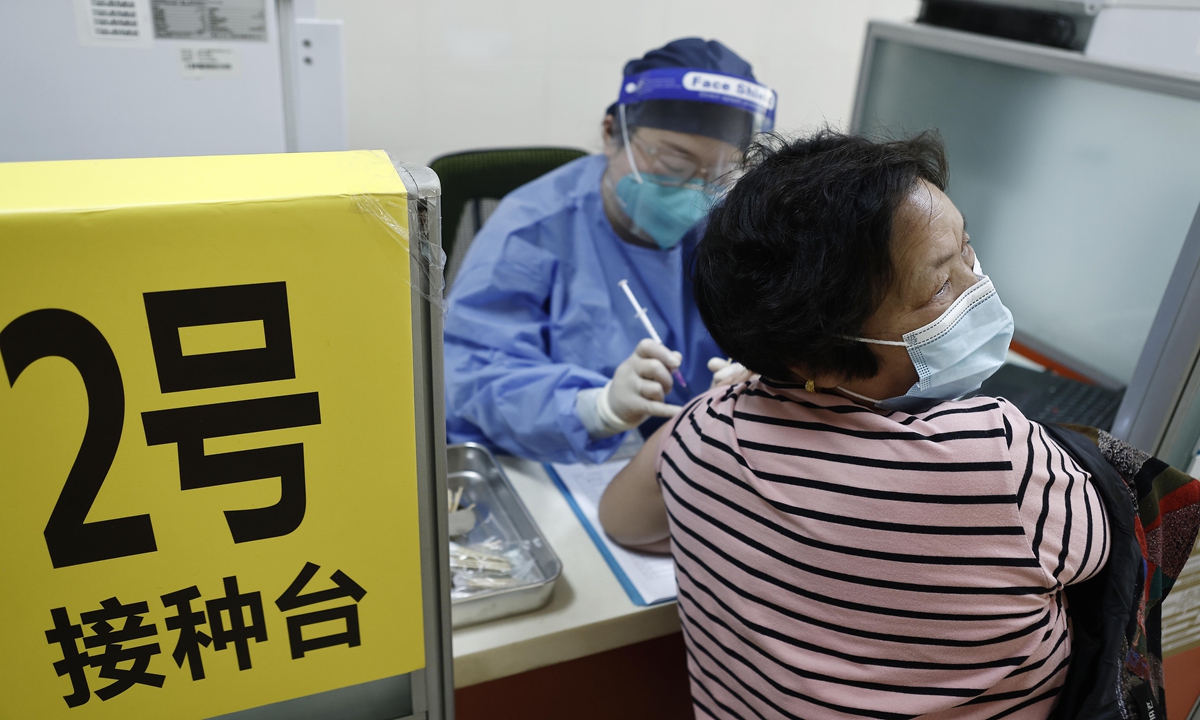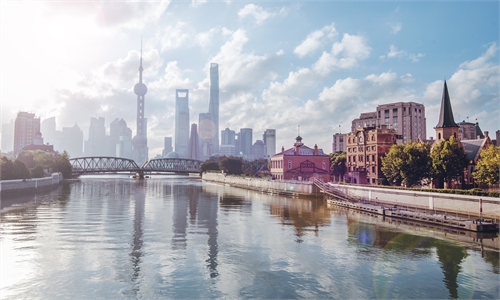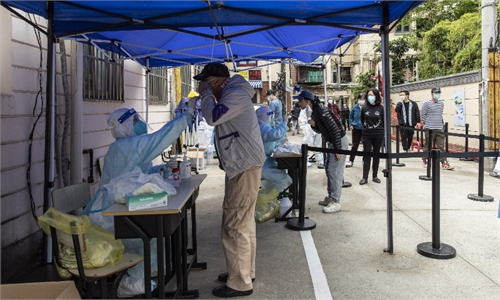Shanghai accelerates vaccination rate for seniors to prevent deaths; positive cases drop for six consecutive days

An elderly woman receives COVID-19 vaccine in April in Shanghai. Photo: VCG
Shanghai, a megacity with a population of over 25 million residents, has recorded a drop in the number of new COVID-19 positive cases for six consecutive days after being under "static management" for one month, but it has seen a surge in severe cases and deaths, with experts agreeing that it should be a top priority to raise the vaccination rate for seniors to prevent further deaths.
Shanghai has recorded over 500,000 positive cases over the latest outbreak and is still facing challenges in treating severe COVID-19 patients as 47 more deaths were recorded on Wednesday.
The 47 patients had an average age of 84.7, and all had severe underlying diseases. Among all the 285 deaths in Shanghai, only 14 were vaccinated, the Shanghai local health commission said on Thursday.
Mi Feng, a spokesperson for the National Health Commission (NHC) said on Thursday that the vaccination for seniors should be accelerated. As of Wednesday, over 3.3 billion doses of COVID-19 vaccines have already been administered on the Chinese mainland, said the NHC.
"Vaccination can significantly reduce the incidence of severe illness and death among seniors," Lu Hongzhou, head of Shenzhen's anti-epidemic expert team told the Global Times.
In Shanghai, temporary vaccination sites have been established in senior care homes in some regions; also, special buses are being used to transport the elderly in communities with specialized services also provided. The city has also implemented other measures such as investigation into the vaccination situation for those seniors aged 60 and above using big data.
Over 3.6 million people aged 60 and above in Shanghai have received a full course of COVID-19 vaccine, with the rate reaching 62 percent; among them, more than 2.2 million have had a booster shot, up to 38 percent, official data shows.
"It would be a potential risk for Shanghai as the vaccination rate for seniors is relatively low compared with some other cities such as the Hong Kong Special Administrative Region," Jin Dongyan, a biomedical professor from the University of Hong Kong told the Global Times on Thursday.
Jin said that seniors had concerns over the side-effects of the vaccines as many seniors have underlying diseases, and some of them believed that the pandemic situation has gradually improved so they don't need to take vaccines.
In Hong Kong SAR, the rate has reached about 76 percent for those seniors aged 60 and above who have received two doses of vaccines, Jin said. In other cities, the vaccination rate among over 2 million seniors aged 60 and above in Shenyang, Northeast China's Liaoning Province reached nearly 78 percent, while over 3.4 million people aged 60 and above in Beijing have received their first dose of COVID-19 vaccine, with the rate reaching 80.6 percent.
It would be a basic requirement to raise the rate up to 80 percent nationwide, so that China could re-open gradually, Chen Xi, an associate professor of public health at Yale University, told the Global Times on Thursday.
Along with vaccine protection, nutrition support and improved mental health services could also be ways to enhance immunity for seniors, a Beijing-based immunologist told the Global Times on the condition of anonymity on Thursday.
Experts believe the pressure of treating severe patients through Shanghai's medical system will be short-lived, and some doctors suggested setting up an early warning system detecting severe illnesses early so that timely treatment could be made available.


